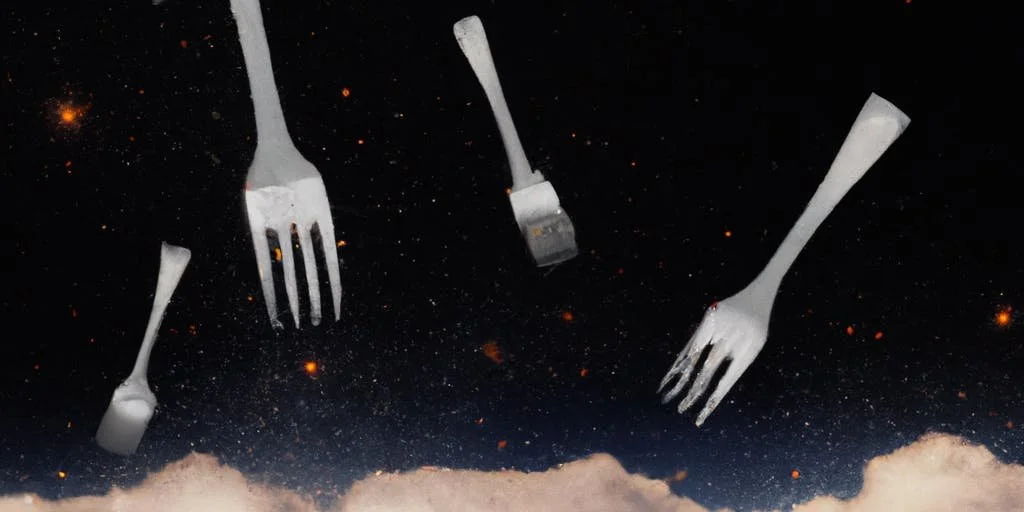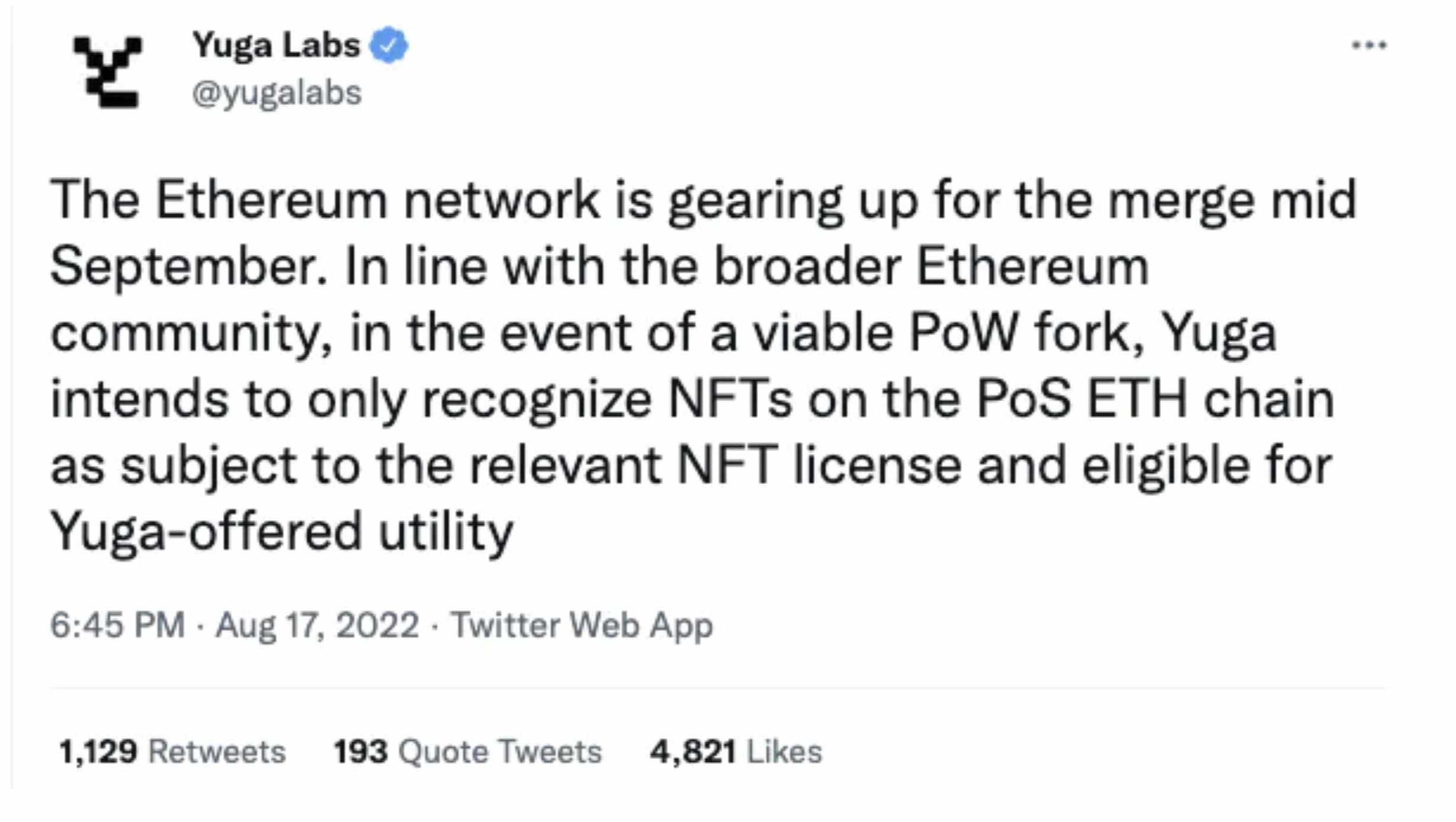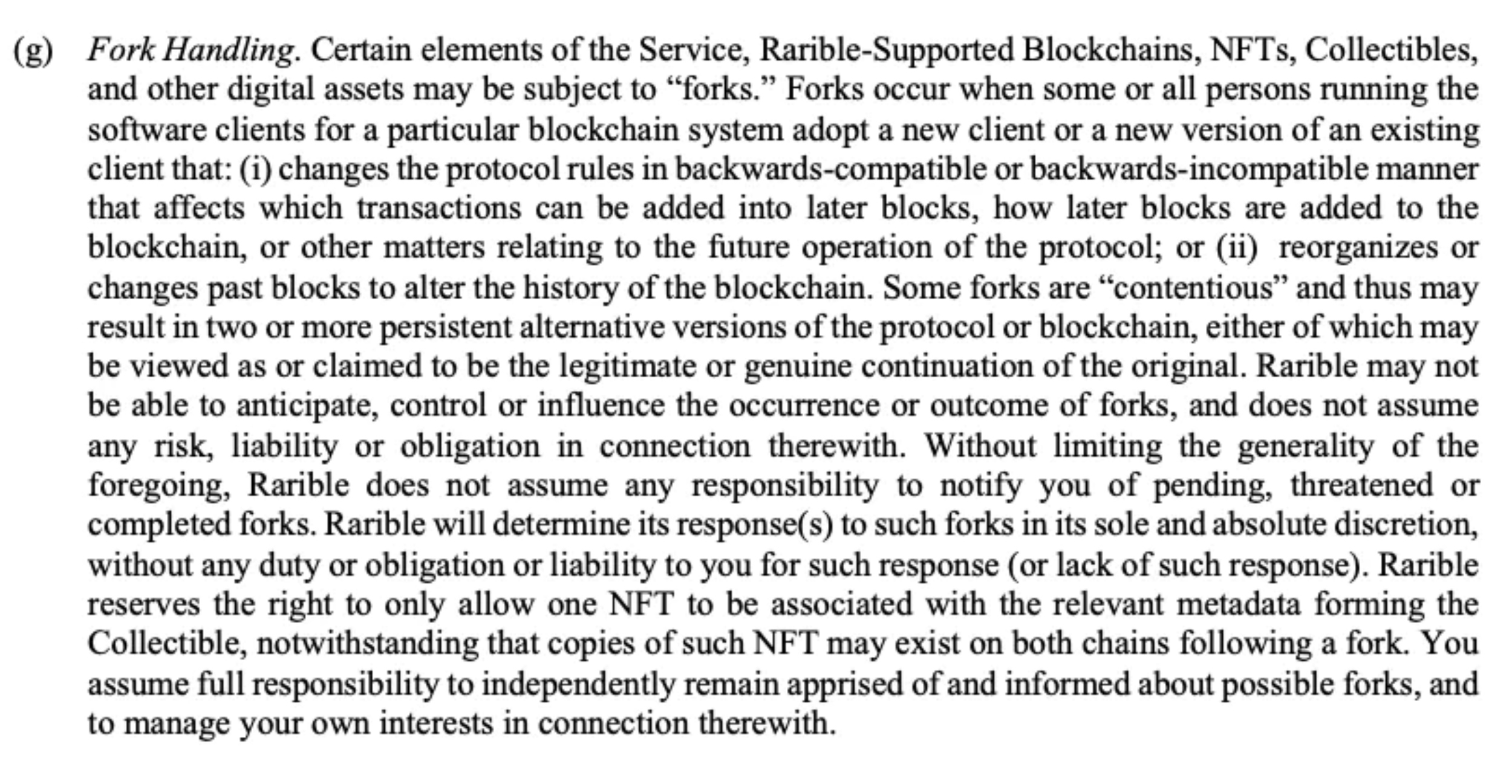Hard Forks & Intellectual Property (IP) Licenses Flowing from NFTs
By Jessica Neer McDonald, Esq.
Happy Merge Day, Ethereum! With talks of a “hard fork” coming as a result of the Merge, this article gives a brief background on hard forks and its relation to intellectual property (IP) licensing via non-fungible tokens (NFTs). IP licensing rights can be clarified by NFT projects and marketplaces with regard to forks, which is relevant regardless of the blockchain.
The Merge refers to the joining of the existing layer of Ethereum (Mainnet) with the new consensus layer (Beacon Chain). This is a transition of how the Ethereum blockchain achieves agreement with regard to the data in the network. Today the network went from the original proof-of-work (PoW) mechanism to proof-of-stake (PoS). Officially, the process of validating transactions and proposing blocks changed, though the smart contracts recognizing Non-Fungible Token (NFT) holders remain unaffected. Yet, there is mentioning of a hard fork being formed, which would create a new PoW chain that has copies of the same smart contracts with the same assets up to the time of the fork. In other words, a NFT holder could hold the same NFT on the PoS chain and the alternative, “hard forked” PoW chain without doing a thing. How might this affect intellectual property (IP) permissions that flow to NFT holders?
Many NFT projects license IP rights related to artwork, music, and other media via NFTs. In contrast to traditional licensing, often there is no need to contact the project/IP owner and negotiate a license, but you can simply purchase the NFT & the outlined rights are yours. The novelty of NFTs acting as a license vehicle with the same NFT existing on different chains cause uncertainly with respect to the IP licenses. Does a purchaser on any chain acquire the rights under the project's IP license? Can the PoS NFT holder sublicense their rights from the original license to a PoW NFT holder? This uncertainty may also extend to other utility offered through NFTs, such as membership to certain organizations, tickets to events, access to physical items, and more.
Notably, IP licenses vary across projects, and even in circumstances where there are written licensing terms to review, the answer can remain unclear. NFT projects can clarify how any IP or other utility rights flow in the event of a hard fork through their license agreements, terms of service, and/or other public announcements. In a similar light, NFT marketplaces that allow for the buying, selling, and trading of NFTs can clarify if NFTs on “hard forked” chains will be recognized. For example, if a “hard forked” PoW chain existed, would those NFTs be able to be bought, sold, or traded via that marketplace? Communication can be a tool in easing potential confusion for buyers and sellers that have an intent on relinquishing or buying NFTs with associated IP licenses and utility.
In response to the possibility of a hard fork, projects and marketplaces have responded differently. While the majority remain silent, others have taken affirmative steps specific to the Merge or otherwise.
For example, the well-known NFT project owner, Yuga Labs, Inc., incorporated term 13(a) in their CryptoPunk NFT license. The term specifies that the license applies only to the CryptoPunk NFT on the blockchain that Yuga Labs designates.
The Yuga Labs blockchain designation term goes so far as to specifically state, "Any license purportedly granted hereunder to the owner of a non-fungible token recorded on a blockchain not designated by Yuga Labs is void ab initio." Not surprisingly, Yuga Labs has publicly stated it will only recognize NFTs on the PoS ETH chain.
Other NFT projects have also publicly stated they would only support the PoS ETH chain, such as World of Women, Vee Friends, AvaStars, Gutter Cat Gang, Degen Toonz, Yung Ape Squad, THEblocktunes, Outlaw Gals Motorcycle Club, Cheers UP, Knights of Degen, Royal Eggs, and HPPRS.
The NFT marketplace Rarible has an entire section of its Rarible Terms of Service, last updated September 8, 2022, called “Fork Handling.” While observing NFT copies can exist in the event of a fork, Rarible reserves the right to only allow one NFT.
OpenSea and Rarible have also publicly declared their protocols would not support forked versions.
Using NFTs as a license vehicle brings an ease of obtaining licensed rights, though it is not without its complications. Associated projects and marketplaces can take affirmative steps to clarify the flow of IP licenses to prospective buyers, sellers, and traders, which in turn, effects downstream enterprises and consumers. Fork or no fork, it helps to have the right utensils for managing IP licenses.
The initial image used in this article is AI-generated through the use of DALL·E, by OpenAI.
Neer McD PLLC© 2023. This work is licensed under a CC BY 4.0 license. This license allows reusers to distribute, remix, adapt, and build upon the material in any medium or format, so long as attribution is given to the creator. The license allows for commercial use. An example of proper attribution is, “[Article Title]” by [Author] of Neer McD is licensed under CC BY 4.0.
This information is educational and informational in nature and should not be relied upon as legal, business, investment, tax, or any other advice. No representation is made as to the accuracy of the information. Please consider this a high level review that is not comprehensive and consult with professional advisors as needed. Moreover, nothing in this article should be construed as forming an attorney-client relationship.





